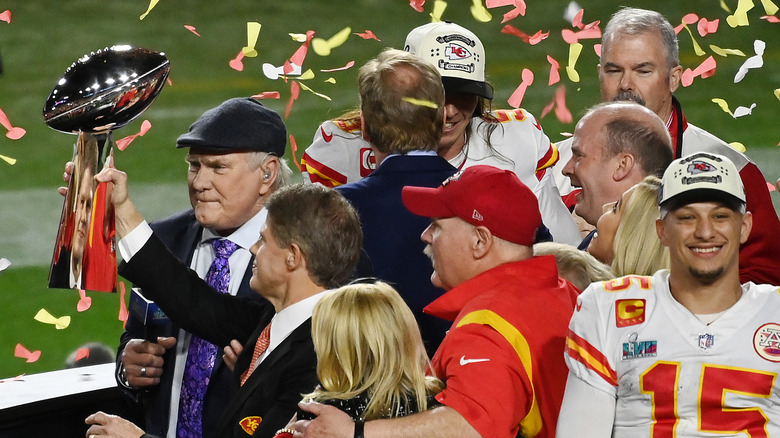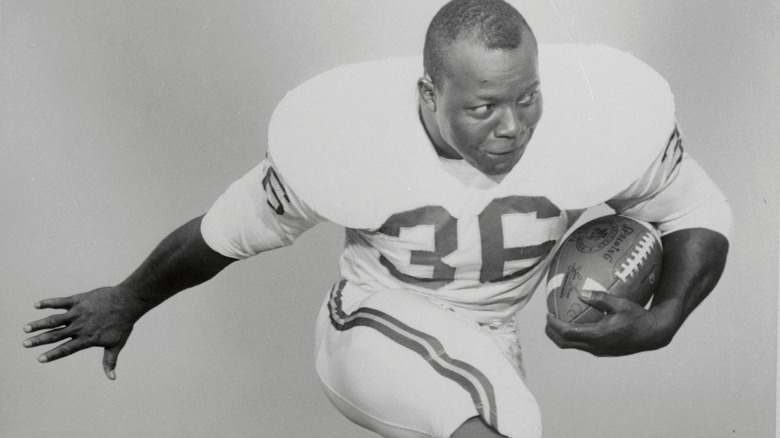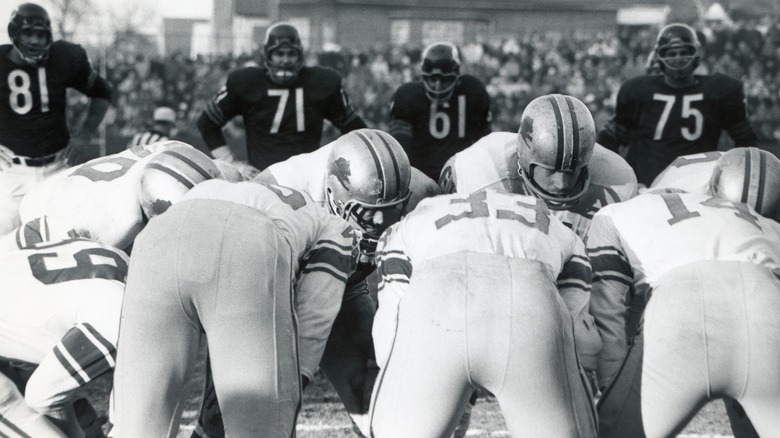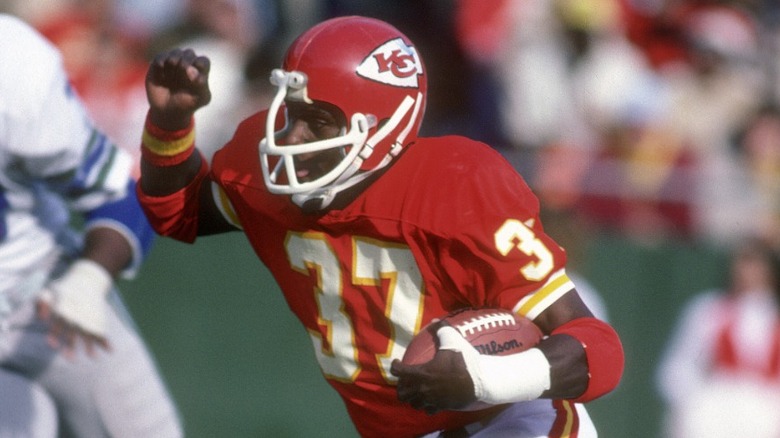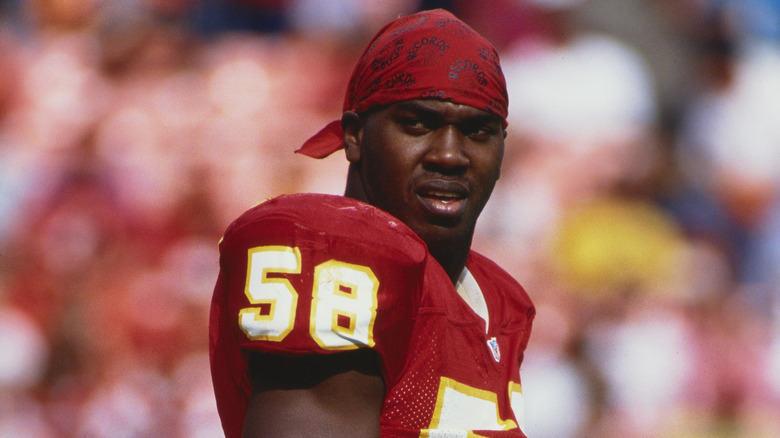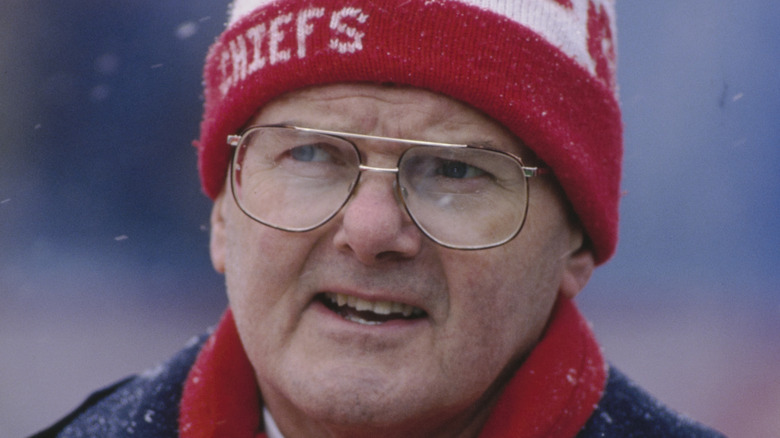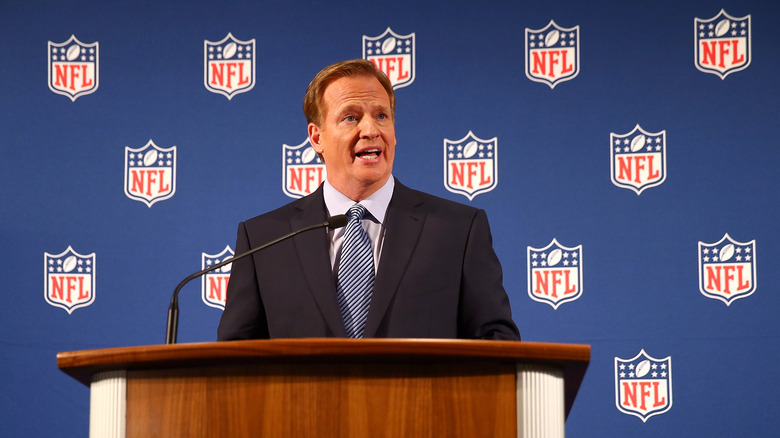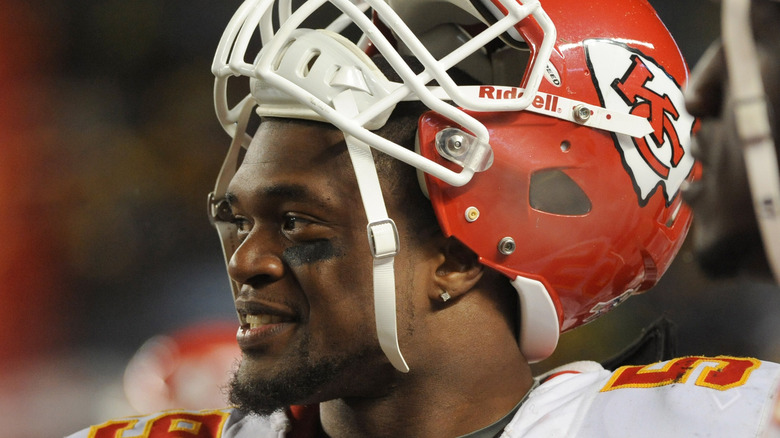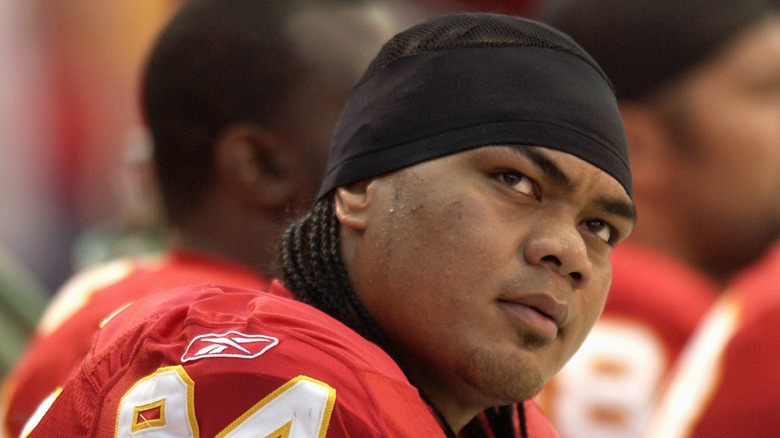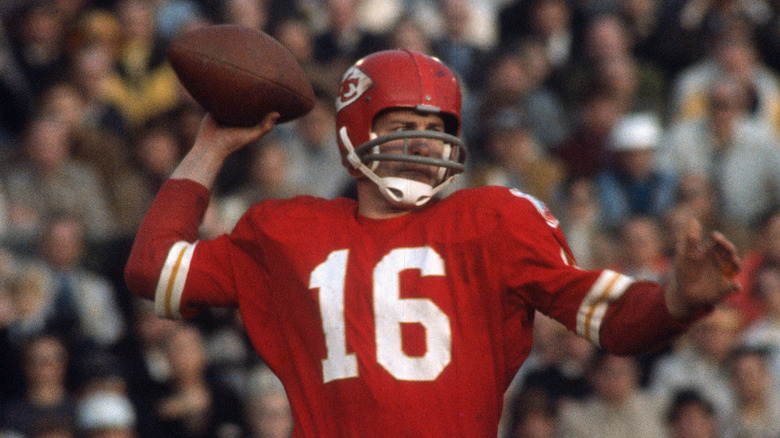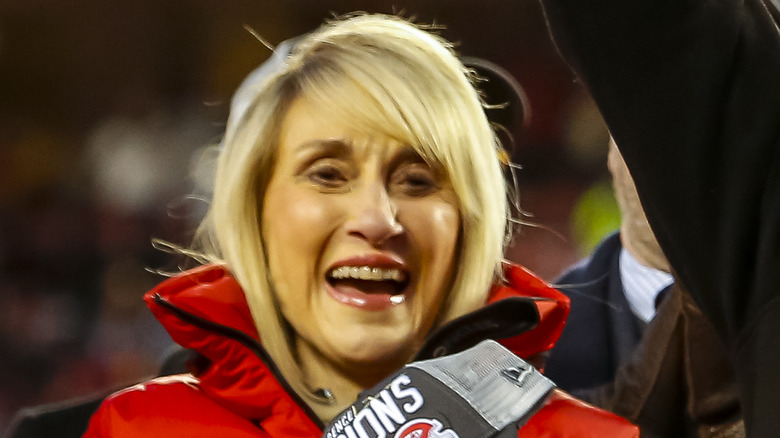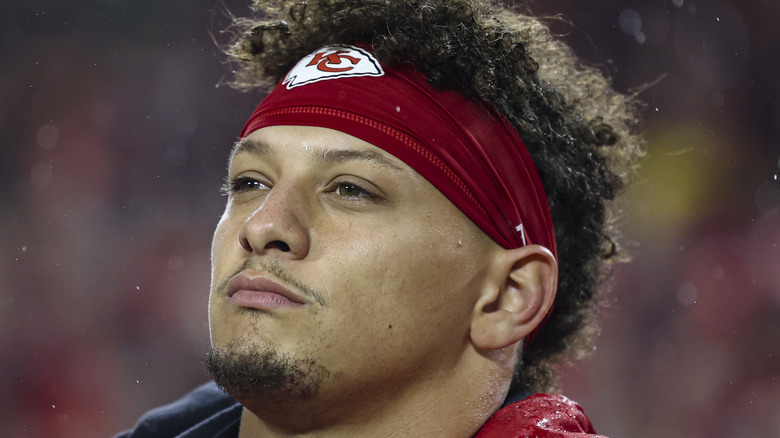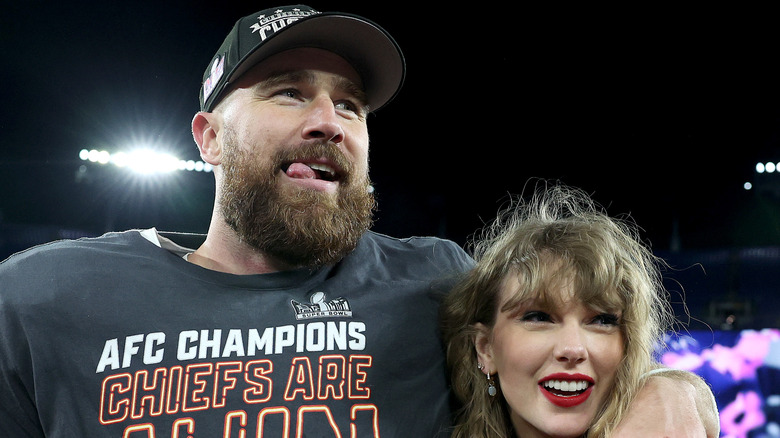The Tragic Truth About The Kansas City Chiefs Football Team
It doesn't matter who your favorite NFL team is — these days, almost everyone has a soft spot for the Kansas City Chiefs, reigning NFL champs and winner of two of the last four Super Bowls. And they're beloved for more than just their victories on the field. Fans love the apple pie purity of Patrick Mahomes, a creative play-making pivot who married his high school sweetheart, and veteran coach Andy Reid, the visual equivalent of Wilford Brimley.
Then there's tight end Travis Kelce, whose eligible bachelorhood status has recently been thwarted by his highly-publicized courtship with musical dynamo Taylor Swift (whose appearance in the skyboxes at Chiefs games has spiked NFL TV ratings and quadrupled the sales of Kelse jersey merch). The pandemonium over the couple even enticed one fan to tweet, "Taylor Swift and Travis Kelce driving in a convertible around Kansas City, Missouri, is the American equivalent of the Royal Wedding."
There's no doubt the players' backstories have helped make the Chiefs irresistible. But like any individual or group, the team has faced as many hardships as they have triumphs, and the Chiefs have done more than their fair share of mourning. Granted, some of the team's heartbreaking losses were the result of old age, while several were due to circumstances beyond anyone's control. But a few of them were so controversial that even the NFL had to stand up and pay attention.
A promising running back died in surgery
Mack Lee Hill never played in the NFL. He spent less than two seasons with the Kansas City Chiefs and was long gone before the NFL announced that they would absorb the American Football League franchise in 1966. But his brief tenure with Kansas City was so impressive, he became the franchise's second-leading rusher during his rookie season, prompting pigskin followers to dub him "The Truck."
Hill may have played only 27 games when the Chiefs signed him as a free agent in 1964, but during that time he accumulated 1,203 yards on the ground and 403 yards in the air, resulting in nine touchdowns, according to Fox Sports. "Every time he touched the ball, every time he hit the field, you were getting 120 percent," former teammate Bobby Bell told the outlet. "He was so good we kept waiting for something to be wrong with him," said Henry Stram, Hill's coach at the time, to Sports Illustrated.
Sidelined by a knee injury in 1965, Hill went under the knife to correct the problem. But after the procedure, his body temperature inexplicably jumped to 108 degrees, resulting in a severe heat stroke that ended his life, per the Associated Press. He was 25. In a report issued two months after he died, doctors indicated that such a case was rare. Shocked over the loss of a major prospect, the Chiefs retired his No. 36 jersey and has since named its Rookie of the Year honors in his name.
This Chiefs signee died before getting a chance to play
At 6-foot-3-inches, weighing 210 pounds, Bruce McLenna was bigger than most running backs, but that's what impressed coaches during his post-secondary years at Hillsdale College and Staunton Military Academy in Virginia. His abilities earned similar accolades when he was drafted by the Detroit Lions in 1965. "He doesn't impress you too much running around in shorts in practice," noted Lions backfield coach Sammy Baugh (via Greater Flint Area Sports Hall of Fame). "But he looks good when they put the helmets on and things get rough. He runs pass patterns well in addition to being a fine runner. I'm pretty well sold on that boy."
A knee injury shortened his rookie season with Detroit in 1966, and he was dealt to Baltimore and New Orleans until he nabbed a spot on the Kansas City Chiefs practice roster. The coaching staff shifted him to a backup role in time for the 1968 season, but sadly, fans never got to see the results of that promotion. Prior to training camp, while serving with the Missouri National Guard, McLenna was killed when the military vehicle he was riding in crashed into a ditch after a sideswiping collision with a car. "The accident was listed as a minor accident by the Missouri Highway Patrol at first," reported the Associated Press, noting McLenna had a head scratch and a bruised shoulder. It later turned out he had suffered a broken neck. He was 26.
A player drowned while trying to rescue three children
On the field, Joe Delaney risked serious injury to help the slumping Kansas City Chiefs get back to their winning ways. But away from the hashmarked turf, the star running back risked something far more precious when he put other people's fates before his own. In June of 1983, just before he was about to start training camp for his third season with the Chiefs, Delaney was lounging at his home in Monroe, Louisiana, when he noticed three boys flailing in a pond bordering his property.
"I can't swim good," Delaney apparently said to a neighbor at the scene, per Sports Illustrated, adding, "but I've got to save those kids. If I don't come up, get somebody." After jumping into the pond fully clothed, Delaney managed to save one child, before he drowned. He was 24. A second youngster suffered the same fate and the third child later died in hospital. "It's never left my mind," said Marvin Dearman, the man who carried Delaney back to land, per NBC Sports. "Basically, he died in my arms, and it's something I've never forgotten."
Older fans won't likely forget that Delaney contributed heavily to the Chiefs' first winning record in a decade via 1,121 rushing yards and three touchdowns, which earned him AFC Rookie of the Year honors in 1981. But Delaney's willingness to help Kansas City turn around its losing fortunes pales in comparison to his rescue effort. Because of that selflessness, one child survived.
A linebacker great died after a car accident
To say that Derrick Thomas made an impact in the NFL when he joined the Kansas City Chiefs in 1989 would be an understatement. For 11 seasons while donning the Arrowhead helmet, Thomas was a one-person wrecking crew, as he crushed the opposition with a career 126.5 sacks, 41 forced fumbles, 19 fumble recoveries, and three safeties (per Bleacher Report).
All indications were that his playing days were far from over until a car accident in late January of 2000 left him partly paralyzed. Two weeks after the mishap, a blood clot killed him at age 33. Affectionately called "D.T." among followers, the Chiefs understandably gave fans a chance to pay their final respects by bringing his coffin to Arrowhead Stadium. Thomas was posthumously inducted into the Pro Football Hall of Fame in 2009 and was honored during a Chiefs game against the Denver Broncos in October of 2023.
Brian Mitchell, an NFL all-star in his own right, remembered Thomas as a grounded athlete. He also recalled the former Alabama linebacker's sacking ability in college as a quarterback in Louisiana. "Down-to-earth, fun-loving," Mitchell said to ESPN. "But when he got on the football field, he knew how to flip that switch." NFL coach Bill Belichick had only one word for the Chiefs defender while helming the Cleveland Browns. "Fast," he said to AL.com. "If he beat you off the edge, it was all over, and he beat a lot of guys off the edge."
The original team owner died in 2006
Kansas City would likely have never enjoyed housing an NFL franchise if not for oil baron progeny Lamar Hunt. Failing to land a team of his own with the league, Hunt and a few other tycoons got together to start the rival American Football League, which began regular-season play in 1960. He also had a franchise of his own in the league, the Dallas Texans, which moved to Kansas City and was renamed as the Chiefs in 1963. The Chiefs were among the stronger franchises when the AFL and the NFL merged in 1966. Kansas City was the first AFC team to play in the merger final (before it was called The Super Bowl) in January of 1967, losing to the NFL's Green Bay Packers.
Hunt was known for having a steady hand on the Chiefs rudder until prostate cancer claimed his life in 2006. He was 74. "Lamar Hunt was one of the most influential owners in professional football over the past 40-plus years," said Pittsburgh Steelers chairman Dan Rooney to ESPN. He's especially credited with cracking the race barrier by hiring a scout to recruit players from Black colleges. "Lamar felt there were some great, great players that were overlooked because they were Black," said Chiefs football executive Jack Steadman, per NFL.com. In Super Bowl IV, which saw Kansas City beat Minnesota, the Chiefs boasted 19 Black players, compared to their opposition's 10. Hunt's son Clark has since taken over running the team.
A murder helped push the NFL to tackle domestic violence
One tragedy that affected the Kansas City Chiefs didn't involve anyone with the team, but an employee at the franchise's home base at Arrowhead Stadium — and it was one of many deadly altercations that pressured the NFL to combat the increasing level of domestic violence plaguing the league's public image. In September of 2012, Luis Roberson Rodriguez, who worked at the Chiefs venue, drove to Tampa, Florida, where ex-girlfriend Jamie Kimble resided, according to USA Today. After fatally shooting 31-year-old Jamie, who had recently left Rodriguez due to an abusive relationship, Rodriguez turned the gun on himself. He was 39.
To heighten the awareness of domestic violence, her parents started the Jamie Kimble Foundation for Courage the following year. "If I'm feeling sorry for myself, I always go back and think of Jamie," said her mother, Jan Kimble to Charlotte Magazine. She would want us to help others and prevent this from happening to anyone else." They also volunteered their services to the NFL to address the issue. "My wife and I stand ready to assist the NFL and its teams to tackle domestic violence," said husband Ron Kimble to USA Today. "We can talk first hand to the issue of domestic violence in our family and in the NFL."
Whether league commissioner Roger Goodell paid much attention to the offer isn't known. But that message got stronger when another tragedy took place three months later, this time involving a Chiefs player.
If you or someone you know is dealing with domestic abuse, you can call the National Domestic Violence Hotline at 1−800−799−7233. You can also find more information, resources, and support at their website.
A linebacker's troubled life ended in a murder-suicide
While few people will remember Jovan Belcher's contributions to the Kansas City Chiefs, they're likely to recall how the athlete died by suicide on December 1, 2012. Showing up for practice at Arrowhead Stadium and in front of members of the Chiefs' managerial and coaching staff, Belcher shot himself in the head. He was 25. The horrific incident was precipiated by an incident earlier that morning, when he and 22-year-old girlfriend Kasandra Perkins had a heated argument about his overnight carousing. According to the Kansas City Star, Belcher shot Perkins, apologized, and kissed her on the forehead. He also apologized to his mother, who heard the shots, then kissed his infant daughter goodbye.
While shocking, the news wasn't enough to dissuade the players from canceling an upcoming game against the Carolina Panthers, which they won. After that bittersweet victory, teammate Shaun Smith admitted having mixed feelings about the tragedy. "I'm going to miss him," he said to The Guardian. "But I feel sorry for [Perkins's] family, too, because they lost a loved one. We've got to continue to stay strong and stay together."
The Belcher calamity was among several instances of domestic violence affecting NFL players that the league seldom addressed. Two years later, NFL Commissioner Roger Goodell admitted as such. "We do not have a clear and consistent policy that allows us to deal with all of the issues that are arising," he said, per CBS News.
If you or someone you know is dealing with domestic abuse, you can call the National Domestic Violence Hotline at 1−800−799−7233. You can also find more information, resources, and support at their website.
A former defender died in prison
Saousoalii P. Siavii Jr., better known as Junior Siavii, first made waves in 2003 when he ventured across the Pacific from American Samoa to Oregon, where he played college football. A ferocious tackler with the Ducks, Siavii once remarked about how much he wanted to impress his family, who made a rare trip to see him play. "I just want to shine in front of them," he said on Oregon Sports Network's "Mike Bellotti Show." "Play hard, don't fall down too much, don't make too [many] mistakes." The Kansas City Chiefs drafted the defensive tackle in 2004, but due to knee injuries, he was cut two years later. After stints with the Dallas Cowboys and Seattle Seahawks, he left the NFL in 2011.
Siavii struggled with life after football, eventually turning to drugs. He was twice arrested for possessing illegal drugs and firearms, but it was his third brush with the law in 2019 that ended in tragedy. According to a news release from the Missouri District Attorney's office, Siavii was spotted driving a stolen Jeep Wrangler and was arrested after officers had to taser and wrestle the 330-pound man to the ground. "Officers searched Siavii's backpack and found additional ammunition, 5.2 grams of methamphetamine, 12.2 grams of marijuana, and drug paraphernalia," added the release. Charged with three counts of a drug user illegally owning firearms, Siavii died in Leavenworth Prison in Kansas while awaiting trial in 2022. He was 43. The cause of his death was never released.
If you or anyone you know needs help with addiction issues, help is available. Visit the Substance Abuse and Mental Health Services Administration website or contact SAMHSA's National Helpline at 1-800-662-HELP (4357).
Kansas City embraced this legendary quarterback
Long before Patrick Mahomes and Travis Kelce became superstars, quarterback Len Dawson was an overwhelming favorite among Missouri locals, especially during the Kansas City Chiefs' formative years. Dawson first pivoted for the AFL's Dallas Texans in 1962, a year before the team moved to Kansas City. He scrimmaged with the Chiefs in the first AFL-NFL championship final (later called Super Bowl I), losing to the Green Bay Packers 35-10 in 1967 (per ESPN). But Dawson and company enjoyed payback in 1970 when the Chiefs beat the Minnesota Vikings 23-7 in Super Bowl IV, earning Kansas City its first league title. He later became a radio and television broadcaster covering Chiefs games for more than 30 years before retiring in 2017. He was 87 when he died in 2022.
The Chiefs embraced the impact Dawson had on the team and the city. "Throughout his remarkable career, Len made it a priority to give back to the community that he loved," said Clark Hunt, the team's chairman and CEO, in a statement. "The franchise has lost a true legend."
And even though Mahomes broke Dawson's single-season franchise record of 30 touchdown passes, he was still amazed by the veteran's achievements. "When you throw 30 touchdowns in today's league where there's a lot more passing, you're still having a great season," said Mahomes, per NPR. "For him to be that advanced, I mean he won a Super Bowl here. He was one of the best quarterbacks to ever play."
Chiefs matriarch was the team's heart and soul
Lamar Hunt may have been the brains behind the Kansas City Chiefs, but his wife Norma Hunt was undoubtedly the organization's heart and soul. Rather than stand in the shadows of her husband, she joined him regularly on the gridiron front lines, even earning a distinction of being the only woman to attend every Super Bowl game, including the 2023 incarnation that saw the Chiefs win its third league championship. Norma even had a special connection to the Super Bowl, indirectly playing a part in naming the pigskin summit in the '60s. It started when she purchased a Super Ball toy for the Hunt youngsters, prompting husband Lamar to engage in some wordplay, before penning a letter to NFL Commissioner Pete Rozelle his tongue-in-cheek notion. "I have kiddingly called it the 'Super Bowl,' which obviously can be improved upon," he wrote, per Fox News.
Norma was 85 when she died in 2023. "Our family is deeply saddened by the passing of our mother, Norma," said her son Clark, currently the Chiefs chairman and CEO, in a statement. "She was a wonderful mother and an extraordinary woman who will be dearly missed by all who knew her." According to players on the Chiefs squad, it was a joy to have Norma around. "Mrs. Norma was the best," tweeted Patrick Mahomes. "Glad to be a part of this special organization she help build. She will be missed! Prayers to the entire Hunt family."
Patrick Mahomes' father was nailed on DWI charges
Shortly after the Kansas City Chiefs clinched an AFC conference title in January 2024, famous quarterback Patrick Mahomes faced terrible news — his father had been arrested by Texas police on suspicion of driving while intoxicated. During a traffic stop, authorities reported that Patrick Mahomes Sr. had an open beer in his vehicle and admitted that he had a few ales before getting behind the wheel via the New York Post).
With a bond set at $10,000, he was released from custody a day later, according to court records. Conditions forbade him from consuming alcohol and illegal drugs, yet allowed him to see his son play in the NFL final in Las Vegas. Mahomes Sr. has had two prior DWI convictions; a third could put him behind bars for up to 10 years, accompanied by a fine of up to $10,000.
Football pundits were concerned about how the arrest would impact Kansas City's gridiron star as the team prepared for their Super Bowl appearance against the San Francisco 49ers. "When you add on Mahomes Sr. getting a DUI and some of those things to distract you from the moment a little bit, yeah those are things that I worry about for the Chiefs right now," said Phil Simms on "NFL on NBC." Added cohort Mike Florio, "It's something [Patrick Mahomes is] going to have to process, and look, we know he can. We know he's mentally tough enough to do it, but it's just another thing to go on the pile of the other things he's already got to deal with."
The death of a Travis Kelce superfan helped him relate to a Taylor Swift tragedy
Weeks before the Kansas City Chiefs were prepping for the regular season in July 2023, the team was shaken over news that one fan, Jessica Tangen, died from a cardiac-related issue while watching the squad go through their training camp routines. Tangen was a particularly huge fan of Travis Kelce, according to her daughter Kyla. "She would also always watch the Chiefs interview and look for Travis Kelce's part of the interview," Kyla said to KCTV5. Kelce didn't publicly comment on the tragedy, leaving the condolences duties to Chiefs head coach Andy Reid. "The death of mom there to the kids, it's a terrible thing that happened," Reid said, per KMBC News. "We've obviously reached out to them, it will stay that way and continue to support them by contact."
Kelce may have been reminded of Tangen's death when a similar tragedy affected his girlfriend Taylor Swift four months later. The songstress was devastated to learn that one fan, Ana Clara Benevides, died from cardiac arrest after succumbing to 100-degree Fahrenheit temperatures while waiting in line to catch the Rio de Janeiro staging of her Eras global tour. Kelce empathized with Swift, recalling the training camp tragedy, when he tried to comfort the emotionally distraught pop star via phone. "'Travis has been there to console Taylor, as he can sadly relate to the experience,'" said a source to the Daily Mail.

